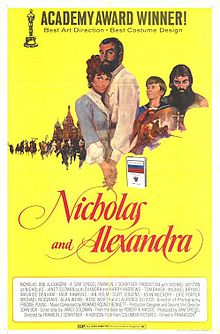
NICHOLAS AND ALEXANDRA
UK, 1971, 188 minutes, Colour.
Michael Jayston, Janet Suzman, Homy Andrews, Laurence Olivier, Michael Bryant, Tom Baker, John Mc Enery, Michael Redgrave, Jack Hawkins, Irene Worth, Alan Webb, Maurice Denham, Eric Porter, Roy Dotrice, Ian Holm, Martin Potter, Richard Warwick, Timothy West, Jean- Claude Drout, Guy Rolfe, Curt Jurgens, Vivian Pickles, Alexander Knox, Julian Glover.
Directed by Franklin Schaffner.
Nicholas and Alexandra is a spectacular re-creation of the last years of the Russian Empire and the Bolshevik Revolution, it is designed and produced on the epic scale although it has few battle sequences and the emphasis is on the personalities of Nicholas, Alexandra and their children and the whole Russian situation.
The film is based on the study by Robert Massie, James Goldman wrote the screenplay and additional dialogue was written by playwright, Edward Bond, Franklin Shaffner's previous film was Patton for which he received an Oscar. Here he marshalls a large, big-name cast who represent the chief figures of Russian history in the early decades of the century. The two principals come from the Royal Shakespeare Company.
The film is dignified, except where it tries to show what kind of charlatan Rasputin was, and regal in its presentation of the court. This contrasts with the Bolshevik sequences where Michael Bryant, made up to look like Lenin, is in command. The Royal Family are shown as good individuals but out of touch with the real people and doomed to revolution and execution. The film is of considerable historical interest and visualises an important epoch.
1. Was this film merely a historical pageant, designed to appeal solely to an audience's love of drama and romance in the past? Or were the intentions of the makers more serious?
2. Would it be more accurate to call the film a study of two individuals, historical personages, within a turbulent, but very real, historical period?
3. The title focused attention on the principal characters rather than the period. Did the film concentrate its attention in a similar way? Nicholas and Alexandra were, for the film, more important than a study of Russia under the Czars, rather than the Revolution?
4. What kind of man was Nicholas - how good-natured and Kindly was he in himself, how good a ruler? How much of his actions was dictated by his Czarist heritage and Russian traditions? How influenced was he by others - Alexandra, Rasputin, his mother, the memory of his father, his Prime Ministers?
5. What was responsible for Nicholas' failure as a Czar - his own nature, changing social circumstances?
6. What kind of woman was Alexandra - a German foreigner, her pride and loneliness, her love for Nicholas, her lack, of understanding Of Russia's problems, her love for her son, her dependence on Rasputin?
7. How did the film show Nicholas and Alexandra responding to particular crises - the Japanese War, Bolshevik insurgency, the First World War, the Revolution? What did this reveal about them both, their ideals, ambitions?
8. Did the film portray the social situation of Russia at the beginning of the century well - the poverty, the role of religion, the worship of the Czar, the opulence of the nobles' way of life, the Czar's lack of knowledge of the ordinary person's plight?
9. What role did Nicholas’ son play in the film - as regards both theme and structure? The film opens with his birth, his parents' concern, the haemophilia and his bleeding, Rasputin's role, the holidays at the Black Sea, the final deaths and the boy's rebuke of his father for not being a successful Czar, This structure contributed to the theme. How?
10. What role did the succession of Prime Ministers play in the film, especially at the beginning of the 1914-18 war and Russia's assessment of German intentions? Kerensky as a stirrer with his country, good at heart, and yet his failure to save Russia?
11. Did the film give some idea of why the Russian Revolution was planned, why, Lenin and his followers were so determined, why the Revolution succeeded?
12. Haw did Russia fare in the First World War? How did the picture here of defeat, insurrection, suicide and despair compare with such presentations of the war as that in Doctor Zhivago?
13. How do you explain Rasputin? How much of a deliberate charlatan was he? How much was part of his personality? Was he in any way a religious man? How shrewd was he? Why could he so convince Alexandra of his sincerity? (Note the fulfilment of his visions and prophecies.)
14. Was Rasputin's death scene appropriate to the whole film? Was it too decadently melodramatic? How did his death reflect the style of his life and personality?
15. Was Lenin presented as a satisfactory dramatic opponent of Nicholas? Was he presented as a plausible alternative to Nicholas? (Note the relationship between Lenin and his wife.) What devices did the film use to show Lenin's potential and importance?
16. What picture of Russia after the Revolution did the film give: the political chaos, the poverty, the suspicions, White Russians versus Reds, the train journey of the Romanoffs and their imprisonment? Did the film take sides?
17. Were you moved by the final days of the family - the love of Nicholas and Alexandra, the girls' growing up, the sickly son disappointed in his father, the humiliations and hardships, the joy at letters, the final executions?
18. The film did not indulge in stylistic tricks but used a more sober and plain style. Was this right for the film?